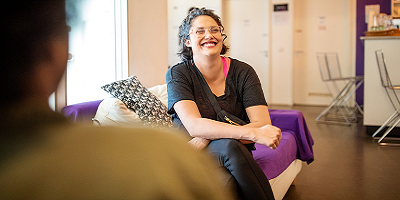While it's normal for our brains to change as we get older, you don't have to accept cognitive decline as an inevitable consequence of aging. Research consistently shows that there are ways to keep our minds fit at any stage of life, which also keeps our bodies healthy and boosts overall life expectancy.
Benefits of keeping your brain healthy
The benefits of keeping your brain healthy include — but are not limited to — reducing the risk of developing Alzheimer's disease and other forms of dementia. The steps you take toward cognitive fitness may also benefit your physical, mental and emotional health, including:
- Improved concentration and memory
- Improved mood and emotional well-being
- Higher metabolism
- Increased life expectancy
- Reduced feelings of depression and isolation
- Improved heart health
- Better quality sleep
9 ways to achieve cognitive fitness at any age
It's never too late to start exercising your brain. Here are nine ways to achieve better cognitive fitness and keep your brain healthy at any age.
Stimulate your mind regularly
Think of mental workouts as cross-training for your brain. For maximum effectiveness, try activities that exercise a variety of skills, such as manual dexterity, coordination and problem-solving. Some examples include learning to play a new instrument, travelling to new places, or painting, reading or playing board games.
Like any other muscle in your body, if you don't use it, you lose it. The more you exercise your brain, the more it will be stimulated to generate new cells that can act as a reserve in the future.
Exercise your body
Regular physical activity can increase the flow of oxygen-rich blood to your brain which also encourages the development of new nerve cells. As a result, your brain becomes more efficient and adaptive and performs better overall.
Whether it's a brisk walk, a round of tennis or a few laps in the pool, you should aim for 30-60 minute sessions three times a week, at a level of intensity that increases your heart rate.
Follow a Mediterranean diet
Incorporate more fruits and vegetables, fish and plant sources of protein, and nuts and unsaturated oils into your diet. Studies show that following this Mediterranean-style diet and minimizing consumption of red meat, processed food, refined sugar, and salt will reduce your chances of developing cognitive impairment later in life.
Regulate blood sugar, blood pressure and cholesterol levels
High levels of blood sugar, cholesterol and blood pressure are all risk factors for dementia in old age. While a healthy diet and regular exercise can go a long way toward balancing your levels, you can also talk to your doctor about additional help in the form of medications or supplements.
Avoid tobacco or alcohol
Avoid smoking, vaping or any other activity that involves tobacco. If you must drink alcohol, limit your consumption to one or two drinks per day.
Reduce stress
While stress is part of everyday life, it can cause vascular changes and chemical imbalances that damage your brain cells if it goes on for too long. Paying attention to your mental and emotional health and practicing self-care can reduce harmful stress.
If you suffer from anxiety, depression or exhaustion, look into strategies such as counselling, lifestyle adjustments and setting boundaries. Take personal time to focus on yourself and make your well-being and happiness a priority.
Get 7 to 8 hours of sleep per night
Most people need at least seven to eight uninterrupted hours of sleep per night to feel and function at their best. Sleep helps clear harmful toxins and protein buildup from our brains and allows them to store and consolidate memories more effectively.
Look into practicing effective sleep habits and speak to your doctor to rule out any underlying health issues that may be getting in the way of solid rest.
Protect your head
Whether you enjoy hitting the slopes, strapping on a pair of Rollerblades, or biking through the trails, any intense physical activity you undertake should include wearing a helmet. It's important to protect your head from any risk of injuries including concussions, as they can increase the risk of cognitive impairment.
Prioritize friendship and social networks
Strong social ties and the feeling of being part of a community are linked to lower risks of dementia. Having an active social life can also boost your confidence and promote feelings of gratitude.
Keep your relationship networks strong through participating in volunteer activities, taking on hobbies, and staying open to new experiences. Stay in touch with family and friends to maintain old friendships while you nurture new ones.
While most people know how to get in good physical shape, adding brain-healthy habits to your routine can pay off in dividends. Exercising your mind can not only fend off dementia but also add years to your overall life expectancy. Make sure to speak to your doctor to see which strategies make the most sense for you.
Learn more about improving your physical and mental well-being.





 To exercise your privacy choices,
To exercise your privacy choices,